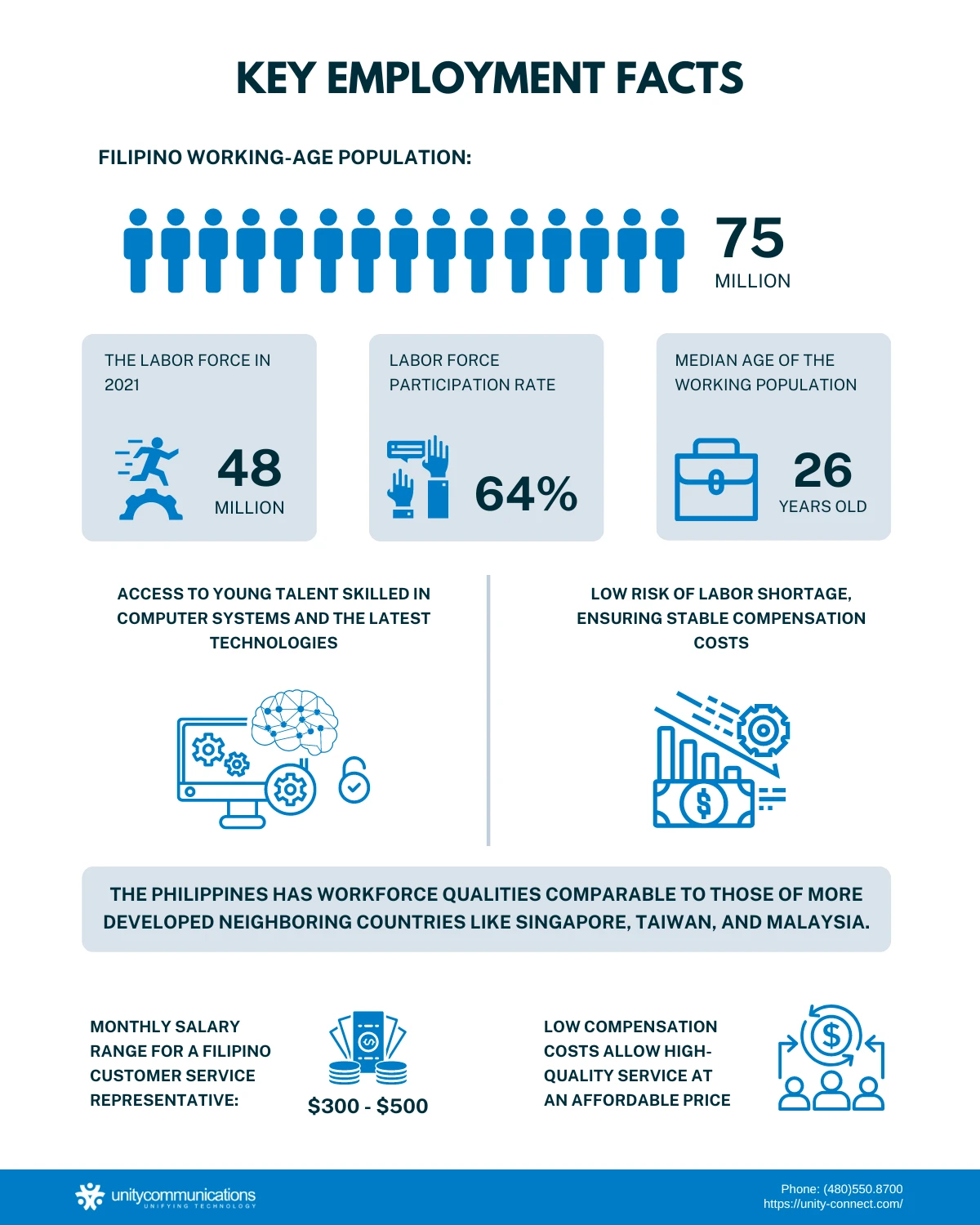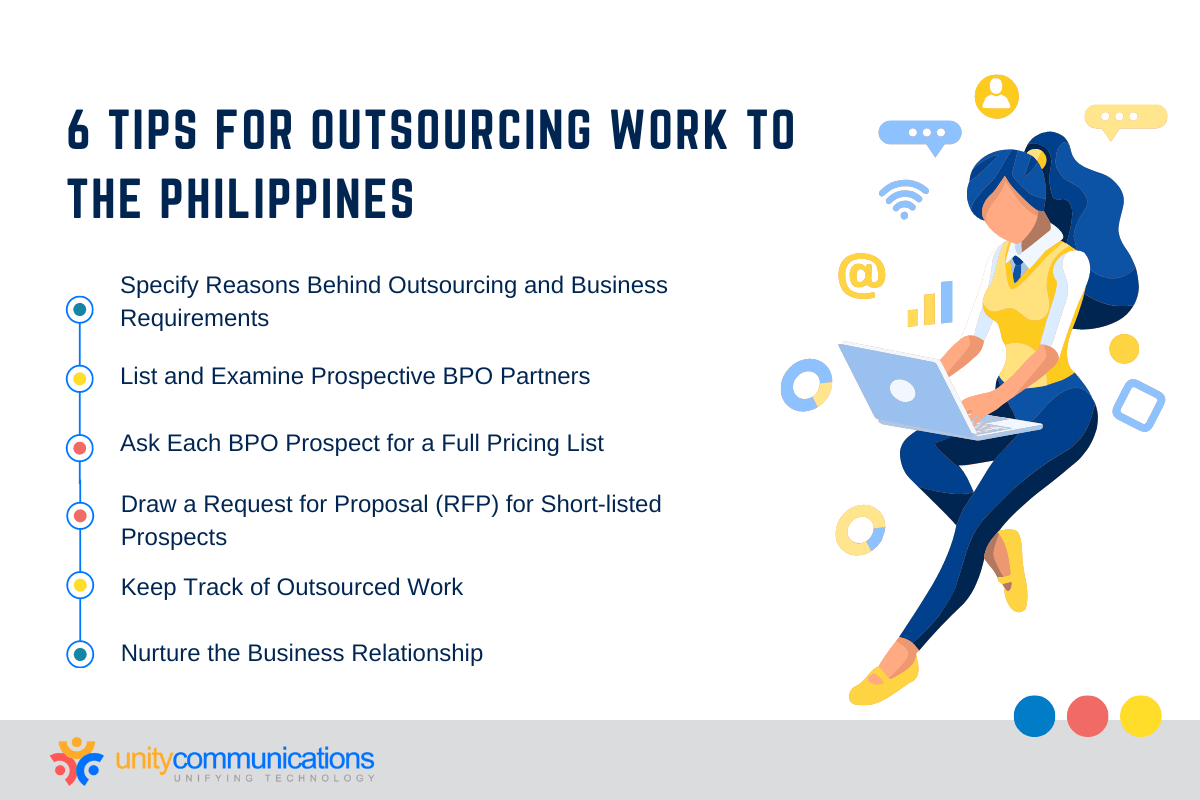IN THIS ARTICLE
Table of Contents
Technology giants, global banks, and multinational companies employ offshoring providers in the Philippines. The Southeast Asian country is among the world’s leading destinations for business process outsourcing (BPO), servicing enterprises and small and midsize businesses (SMBs) alike.
If you think about the Philippines, think about outsourcing.
If you want to learn how to outsource work to the Philippines, this article is for you. Learn more about the country’s BPO industry—its benefits and types, client companies, and costs. You will also learn about how to outsource to the Philippines.
Let us dive in.
Why Outsource Work to the Philippines?

Global companies outsource work to the Philippines because of its many benefits. Learn about some of these benefits below.
Ample Supply of Young and Technically Literate Workers To Handle Work
The latest nationwide survey places the Filipino working-age population (between 15 and 64 years old) at roughly 75 million. Of the total, almost 48 million were in the labor force in 2021. The labor force participation rate (LFPR) is close to 64%, meaning six out of 10 Filipinos are available to work.
Most of the working population comprises millennials and Generation Z, with a median age of about 26 as of 2022. These figures only mean that when you outsource work to the Philippines, you can access a large pool of young talent skilled in computer systems and the latest technologies. They are also adaptable to different work settings.
A large number of employable locals are a boon for the outsourcing industry. A labor shortage is not likely to happen in the next few years. When the labor supply is enough to meet the business sector’s demand for workers, compensation costs remain stable.
First-rate Workforce With Affordable Wages for Better Outsourcing Rates
The Philippines has workforce qualities (e.g., technical qualifications, educational attainment, and soft skills) on par with those of more developed neighboring countries such as Singapore, Taiwan, and Malaysia.
But the Philippine labor cost is much lower. A Filipino working as a customer service representative (CSR) earns between $300 and $500 per month, depending on work experience.
With low compensation costs, service providers operating locally experience reduced total ongoing expenses. Thus, they can offer you first-rate service at an affordable price, charging less than their highly-paid counterparts.
The country’s relatively low wages are attributed to the reasonable cost of living. The $300 to $500 income range can mostly cover a Filipino professional’s needs, including house rent, food, transportation, and utilities. A local worker typically lives with a family member or a companion who is also employed to share living expenses.
High English Proficiency for Smoother Client Communication
Many Filipinos speak English well. The EF English Proficiency Index (EF EPI) includes the Philippines in the “high proficiency” group. The country ranks 22nd overall and is second in Asia, behind Singapore. Since the top 20 are mostly from European countries, the Philippines’ high ranking indicates that many of its citizens speak, read, and understand English.
English is the nation’s second official language. It is taught from grade school to college; thus, most students can effectively communicate using the language by the time they finish their formal education.
Solid English proficiency makes collaboration and interaction easier with Filipino workers. U.S.-based owners, employers, clients, and customers can discuss business with them without language barriers.
Filipinos’ high English fluency makes outsourcing work to the Philippines more appealing. Companies that depend on customer service, virtual assistance, technical support, chat support, and other back-office outsourcing activities constantly need English-speaking workers.
Favorable Work Qualities To Ensure High Productivity and Morale
When you outsource work to the Philippines, expect some healthy work traits to be common among Filipino professionals:
- Reliability. They are generally dependable. Once familiar with work, they can finish tasks even independently. Local workers are also enthusiastic, active listeners, and quick learners.
- Creativity and hard work. Filipino workers are usually industrious, treating their jobs with passion and responsibility. They improvise to overcome any difficulties in the workplace.
- Hospitality and warmth. These traits are among the specialties of the Philippine contact center sector. Filipinos are inherently interested in others, particularly foreigners. They are recognized for their hospitality and warmth. Local professionals serve their employers and customers to the best of their abilities.
- Positive attitude. During bad times, Filipinos normally look at the bright side. This characteristic is advantageous for outsourcing. Filipinos maintain teamwork, productivity, and customer relations regardless of the situation.
Cultural Resemblance for a Better Employer and Customer Rapport
The chance of success for your outsourced operations, such as implementing a contact center as a service (CCaaS) solution, is higher when cultural differences between you and support agents are few.
The Philippines was a U.S. colony for almost half a century (from 1898 to 1946). During this time, Americans introduced the local populace to their lifestyles, including food, music, movies, and fashion. Since then, the Philippines has used several American systems, such as forms of government, criminal justice processes, and educational structures, all written in English.
Additionally, Filipinos and Americans possess similar interpersonal expectations and practices, such as respect for elders, holiday events, close family ties, diversity, multilingualism, and religious beliefs. So they can relate to one another easily.
With close cultural likenesses and English fluency, Filipinos are typically comfortable talking to Americans about different subjects, from fun and sports to politics and business. Cultural harmony gives the Philippines an edge over its outsourcing competitors.
Minimal Legal and Management Liabilities To Reduce Risks and Costs
Outsourcing to the Philippines instead of setting up your own office keeps you away from the possible legal drawbacks of direct employee recruitment. The country’s labor law allows local employees, under certain conditions, to organize labor groups for bargaining leverage.
When you outsource work to the Philippines, your service provider takes care of all hiring matters, shielding you from potential exposure to costly legal liabilities.
The following are the other benefits of outsourcing associated with hiring:
- Wide network. A third-party vendor has extensive connections to local talent. It helps you choose the right applicants for the outsourced work.
- Skilled professionals. A BPO company has an experienced and capable personnel team to supervise job-related processes and concerns. It also manages work harmony and cooperation among local employees.
- Significant cost savings. You no longer need to spend more on additional office spaces, equipment, furniture, computer systems, and office supplies. Your outsourcing partner uses its own infrastructure.
Adaptability to Different Work Settings To Offer Continuous Service
Filipino workers in the BPO industry are willing to accept job rotations, be it in customer service, recruitment, appointment setting, or technical support outsourcing. They are prepared to work in shifts—at night, on holidays, on weekends, and in different time zones. Rotating shifts and weekend schedules are standard employment procedures in the local outsourcing industry.
That means 24/7 operations that allow your in-house employees and third-party agents to handle customer concerns and tickets more efficiently. Your customers encounter shorter wait times because agents are readily accessible for their messages and calls.
Companies That Outsource or Offshore Work to the Philippines
Businesses of all sizes and industries outsource or offshore work to the Philippines. Below are examples of some companies from the U.S., the UK, and Australia.
- Wells Fargo. The financial institution’s main office is in California. It outsources its operations to the Philippines. Customer support, payroll, fraud management, financial accounting, and data analytics are some of the outsourced work for Filipino workers.
- Canva. Established in 2013 and headquartered in Australia, the company is known for its graphic design platform for presentations and social media graphics. It has an offshore team in Manila with over 100 employees who are mostly customer specialists, graphic and web designers, and information technology (IT) engineers.
- Unilever. The multinational consumer goods company is based in London and is the world’s biggest soap manufacturer. It chose the Philippines as an outsourcing destination for its key operations, including logistics, manufacturing, IT, human resources, and finance.
- Google. Began operations in 1998, Google is a California-based technology provider. It outsources different processes to the Philippines, including software development and maintenance, data analytics, and application development. The company hires contractors and IT service providers to help it remain competitive.
- Telstra. Australia’s largest telecommunications provider is headquartered in Melbourne. It offshores some of its operations to the Philippines, such as customer service, email, and chat support.
- Dyson. The household appliance designer and producer started operations in 1991 in England. It outsourced its manufacturing operations in 2016, employing about 600 workers to mass-produce digital motors. In 2020, it established a software laboratory that requires over 400 software engineers and developers.
- Facebook. Owned by California-based Meta Platforms, Facebook is an online social media and networking platform that began in 2004. It has been outsourcing processes to the Philippines since 2016, hiring local teams to handle customer service, technical support, and content moderation.
Types of Outsourced Work in the Philippines

Below are some of the outsourced services available in the country.
Inbound and Outbound Customer Service
Inbound customer service is when customer service agents receive phone calls from customers or users asking questions or complaining about your products or services. The agents answer their queries and resolve issues to provide them with the best satisfaction possible.
In contrast, outbound customer service is when agents contact customers for follow-up surveys or updates. External calls often occur when there are new policy changes. Companies must contact their customers to tell them about these changes and seek their permission.
Technical Support
The Philippines is an ideal option if you plan to outsource tech solutions. Most tech professionals are website developers, IT engineers, network administrators, and system analysts.
IT is a popular professional career among Filipinos. Acquiring technical skills such as computer coding and tech support is not difficult. Local colleges and universities offer courses and online resources that can be taken full-time, part-time, or remotely.
Administrative Support
The Philippines can supply businesses with administrative personnel, including secretaries, data entry workers, appointment setters, receptionists, executive assistants, and other back-end employees. Your daily operations would be disorganized and inefficient without these vital support positions.
Outsource back-office support services if you seek help with clerical and organizational activities such as scheduling for executives, generating spreadsheets and reports, handling projects, writing business letters, and answering phone calls or emails.
Accounting and Bookkeeping
The country has universities and colleges that produce qualified, skilled, and knowledgeable accounting professionals. This makes outsourcing accounting to the Philippines a viable option, especially tax reporting and filing, cost accounting, accounts receivable and accounts payable management, and financial planning and analysis.
Accounting education is patterned after that in the United States. Accounting students must finish a Bachelor of Science degree in accountancy in four years. Graduates must pass the Certified Public Accountant (CPA) board exam to be recognized as full-fledged accountants.
Content Writing and Development
Many Filipinos excel in content writing because of their high English proficiency. The nation is one of the world’s main outsourcing hubs (for a non-English country) for content production, editing, proofreading, digitization, and publishing.
Philippine business process outsourcing companies can help you secure skilled writers at a fraction of the price of their Western counterparts. Outsourcing this process allows you to harness the power of words to market your brand and establish an online presence.
Human Resources and Recruitment
When struggling to find remote workers, you can partner with a local BPO company specializing in talent acquisition. It can offer stress-free solutions for recruiting experienced and qualified professionals for the roles.
With its wide network and access to a large talent pool, the BPO company can swiftly recommend the right applicants for your tasks according to your requirements. It can supply you with manpower even during a tight labor market situation.
Costs of Outsourcing Work to the Philippines
Below are the average salaries of commonly outsourced positions:
| Position | Average Monthly Salary | Entry Level Monthly Salary (1-3 years of experience) | Senior Level Monthly Salary (8+ years of experience) |
|---|---|---|---|
| Accountant | $1,012 | $730 | $1,260 |
| Back-end web developer | $744 | $530 | $959 |
| Bookkeeper | $379 | $174 | $602 |
| Content writer | $674 | $310 | $1,073 |
| Customer service | $560 | $218 | $1,216 |
| Data encoder | $641 | $494 | $1,599 |
| Digital marketer | $619 | $455 | $765 |
| Front-end web Developer | $680 | $312 | $1,080 |
| Full-stack web developer | $755 | $347 | $1,199 |
| Graphic designer | $491 | $226 | $780 |
| SEO specialist | $698 | $512 | $865 |
| Technical support specialist | $549 | $476 | $1,375 |
| Video editor | $574 | $263 | $912 |
| Telemarketer | $414 | $190 | $657 |
| Virtual assistant | $372 | $285 | $448 |
(Note: All these data were culled from SalaryExpert.com except for the back-end web developer, data encoder, and technical support specialist roles, which were sourced from Talent.com. Figures were converted from Philippine pesos (PHP) to U.S. dollars. The exchange rate used was about PHP54 to $1 as of January 30, 2023.)
In the table above, the average salary of a technical support specialist in the Philippines is about $549 per month or $6,588 annually. In the U.S., a tech support specialist’s average annual salary is about $55,705, or approximately $3,900 monthly. When you outsource tech support work to the Philippines, you can save $49,117 ($55,705 to $6,588) per head per year.
The salary figures and computation examples are all estimates. Contact a BPO company to learn about the exact costs and other details.
How To Outsource Work to the Philippines

Check out these useful tips for outsourcing work to the Philippines:
Specify Reasons Behind Outsourcing and Business Requirements
Generate a detailed outsourcing plan before collaborating with a Philippine BPO provider. Identify operational goals and needs. Name the reasons for outsourcing data entry services, help desk support, bookkeeping, graphic design, customer service, or similar tasks.
Take a look at the following objectives as references:
- Heighten brand loyalty for repeat and continuous sales
- Build a stronger business for better earnings
- Use top technologies to streamline workflow
- Cut operating costs to free up more working capital
- Be more adaptable in handling unforeseen challenges
- Concentrate on the core business to improve current products or services
- Establish a wider and more solid market presence quicker
Remember these tips after stating the specifics:
- Decide on the communication channels to use. Identify the popular communication modes your customers use. Examples are messaging apps, social media, phone calls, live chat, email, live chat, self-service options, and chatbots.
- Assemble the proper team size. The number of outsourced employees to hire depends on the task volume, call quantity, and the number of processes.
List and Examine Prospective BPO Partners
The Philippine BPO industry comprises service providers offering various outsourcing services. Consider these pointers when seeking your ideal business partner:
- Look into security procedures. Your potential partner must use the latest cybersecurity technologies to safeguard vital and critical information about your company, clients, and relevant stakeholders.
- Opt for a specialized third-party team. Recruit a BPO company with a dedicated team to focus only on your tasks and can deliver first-rate customer service.
- Learn about their outsourcing capability. Find out how long they have been in the market and the companies or clients they have served. Prioritize a prospect with experts knowledgeable about security compliance, government laws, and industry standards.
- Conduct a comprehensive background check. Get as much information as possible about a candidate. Obtain a list of verified achievements and feedback from their past clients. Read testimonials and reviews from third-party online sources instead of the prospect’s website.
Ask Each BPO Prospect for a Full Pricing List
To better estimate the costs and savings of outsourcing work to the Philippines, request a complete roster of service rates from the candidate. This must include extra charges and hidden fees for a particular delegated process.
Service providers have pricing packages that differ from each other. Be thorough, evaluate each cost, and conduct a comparative analysis. Balance the benefits and risks of each outsourcing service and calculate the total expenses.
After analyzing each prospect’s costs, background, and expertise, it is time to narrow down your candidate pool. Select the service providers that will bring you the most benefits.
Draw a Request for Proposal (RFP) for Short-listed Prospects
Generate an RFP and submit it to each prospect. An RFP is an accepted practice when you outsource work to the Philippines. Interested candidates participate in a bidding procedure and send you price quotations. With an RFP, you can easily determine the best service package within your budget.
Your RFP must have the following information:
- Specifics of the outsourced tasks, such as the timeline and quantity
- The proposed budget for the tasks
- Request for solutions from the partner regarding the tasks
Assess each proposal obtained. Identify the strengths, weaknesses, opportunities, and risks. Pick the provider with the best proposal and close the deal. The next step is drawing up a service-level agreement (SLA).
An SLA is a formal agreement specifying the services your new Philippine BPO partner must provide. This guarantees that the terms to reach the outsourcing objectives will be followed.
Keep Track of Outsourced Work
Monitor outsourced operations to ensure everything goes according to plan and is aligned with the overall business goals. Use these two proven methods to measure performance, operations, and productivity:
- Qualitative. This refers to how knowledgeable a third-party agent is about your services and products. It also includes soft skills, including analysis, collaboration, problem-solving, and active listening.
- Quantitative. Gauges the team’s performance using key performance indicators (KPIs) or metrics with values and numbers. Common KPIs are customer satisfaction scores, net promoter scores, and average response time.
Nurture the Business Relationship With the Service Provider
If you are satisfied with your BPO partner’s overall performance, do your best to maintain and strengthen your working relationship and mutual commitment. A Philippine-based service provider seeks to meet your expectations to retain you as a long-term client.
Sustaining your working relationship with the third-party provider is essential to success. Your local partner helps you thrive and survive, regardless of the circumstances. You should deliver on your promises as well. An open communication line is necessary to enhance and reinforce trust with each other.
The Bottom Line
You obtain several benefits when you outsource work to the Philippines, aside from potentially significant cost savings. Filipinos’ work traits, high English proficiency, and cultural similarities with Americans are some of the things that make the country unique.
If you consider outsourcing, start small. Do not hire too many employees, even though you might find them affordable. A small initial team can help you familiarize yourself with the process, the third-party Filipino workers, and how tasks are done in the Philippines.
Contact an offshoring provider such as Unity Communications to help you with the next steps.





